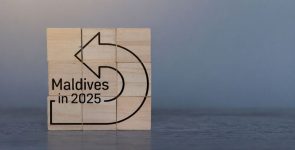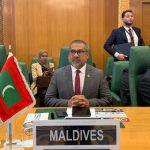
Parliament this week took up a bill that would dissolve the Maldives Broadcasting Commission and the Maldives Media Council, replacing them with a new Maldives Media and Broadcasting Commission. On the surface, it looks like a bureaucratic reshuffle. In practice, it is a struggle over who gets to decide what truth looks like in public life.
But this bill is not a standalone policy tweak. It’s the latest move in a systematic consolidation of power. First over the Parliament, then the courts, and now the press. It reveals a widening trajectory of democratic decay disguised as administrative reform.
A Pattern, Not an Anomaly
Only months ago, Parliament pushed through a constitutional amendment that curbed lawmakers’ independence by enabling the ousting of MPs for party defection. Rushed through in under 24 hours, it eradicated internal debate and public input. Around the same time, the composition of the Supreme Court shifted after the Judicial Service Commission replaced sitting justices. These steps were not about efficiency. They were aimed at suppressing dissent in every chamber of the state.
Now, by targeting the media, the government is striking at the arteries of accountability. Constitutionally, press freedom is enshrined, at least in principle. Yet over time, other reforms have already narrowed the space for independent oversight, weakening the ability of institutions to act as checks on those in power. This new bill continues that trajectory, further eroding the safeguards meant to protect open scrutiny.
The Media Clampdown
Under the new bill, fines could choke journalists (up to MVR 25,000) and media outlets (up to MVR 100,000). Critical voices could be shut down, websites blocked, and registrations cancelled even before due process. The government sells it as modernisation, an embrace of European or Asian regulatory norms, with a nod to curbing “chequebook journalism.” But what looks like regulation is anything but. It is regulatory capture.
Why It Matters
The Maldives already ranks poorly on global press freedom indices, suggesting a cramped, controlled media space. Journalists have faced restrictive laws, harassment, and the financial leverage of state-owned media. This bill accelerates a trajectory seen elsewhere, where pulling independent media into the orbit of government does not reform institutions, it extinguishes them.
Democracy Under Disguise
When every arm of state power, the legislature, the executive, and the judiciary, is brought under de facto control, and when the media is drawn into that same orbit, democracy does not vanish with a bang. It fades in plain daylight, hidden behind the veneer of administrative normalcy. And when the press ceases to serve as a check on power, the whole democratic system loses its purpose. The “free” in free press does not simply mean press that exists, it means press that can critique without fear.
This is not just another bill. It is the next logical step in a hollowing out of democratic checks and balances. If you remove the press’s ability to shine light, then Parliament, courts, and executives can operate with impunity. Maldivians already know how fragile their institutions can be. Once, draconian emergency decrees suspended basic freedoms outright. What is happening now is quieter, slower, but perhaps even more dangerous, because it arrives clothed in reform.









